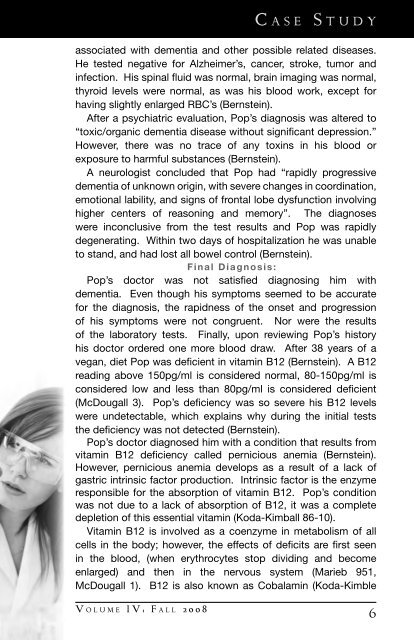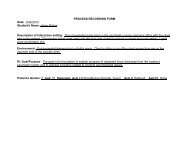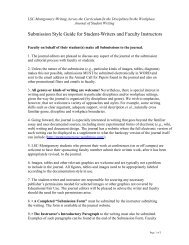2008 - Communication Across the Curriculum (CAC)
2008 - Communication Across the Curriculum (CAC)
2008 - Communication Across the Curriculum (CAC)
You also want an ePaper? Increase the reach of your titles
YUMPU automatically turns print PDFs into web optimized ePapers that Google loves.
C a s e S t u d y<br />
associated with dementia and o<strong>the</strong>r possible related diseases.<br />
He tested negative for Alzheimer’s, cancer, stroke, tumor and<br />
infection. His spinal fluid was normal, brain imaging was normal,<br />
thyroid levels were normal, as was his blood work, except for<br />
having slightly enlarged RBC’s (Bernstein).<br />
After a psychiatric evaluation, Pop’s diagnosis was altered to<br />
“toxic/organic dementia disease without significant depression.”<br />
However, <strong>the</strong>re was no trace of any toxins in his blood or<br />
exposure to harmful substances (Bernstein).<br />
A neurologist concluded that Pop had “rapidly progressive<br />
dementia of unknown origin, with severe changes in coordination,<br />
emotional lability, and signs of frontal lobe dysfunction involving<br />
higher centers of reasoning and memory”. The diagnoses<br />
were inconclusive from <strong>the</strong> test results and Pop was rapidly<br />
degenerating. Within two days of hospitalization he was unable<br />
to stand, and had lost all bowel control (Bernstein).<br />
Final Diagnosis:<br />
Pop’s doctor was not satisfied diagnosing him with<br />
dementia. Even though his symptoms seemed to be accurate<br />
for <strong>the</strong> diagnosis, <strong>the</strong> rapidness of <strong>the</strong> onset and progression<br />
of his symptoms were not congruent. Nor were <strong>the</strong> results<br />
of <strong>the</strong> laboratory tests. Finally, upon reviewing Pop’s history<br />
his doctor ordered one more blood draw. After 38 years of a<br />
vegan, diet Pop was deficient in vitamin B12 (Bernstein). A B12<br />
reading above 150pg/ml is considered normal, 80-150pg/ml is<br />
considered low and less than 80pg/ml is considered deficient<br />
(McDougall 3). Pop’s deficiency was so severe his B12 levels<br />
were undetectable, which explains why during <strong>the</strong> initial tests<br />
<strong>the</strong> deficiency was not detected (Bernstein).<br />
Pop’s doctor diagnosed him with a condition that results from<br />
vitamin B12 deficiency called pernicious anemia (Bernstein).<br />
However, pernicious anemia develops as a result of a lack of<br />
gastric intrinsic factor production. Intrinsic factor is <strong>the</strong> enzyme<br />
responsible for <strong>the</strong> absorption of vitamin B12. Pop’s condition<br />
was not due to a lack of absorption of B12, it was a complete<br />
depletion of this essential vitamin (Koda-Kimball 86-10).<br />
Vitamin B12 is involved as a coenzyme in metabolism of all<br />
cells in <strong>the</strong> body; however, <strong>the</strong> effects of deficits are first seen<br />
in <strong>the</strong> blood, (when erythrocytes stop dividing and become<br />
enlarged) and <strong>the</strong>n in <strong>the</strong> nervous system (Marieb 951,<br />
McDougall 1). B12 is also known as Cobalamin (Koda-Kimble<br />
V o l u m e I V : F a l l 2 0 0 8<br />
6






